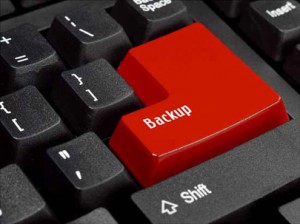Take it as a warning. Learn by my woeful example. There are a thousand stupid tech-based ways you can lose hours or worse of work, whether through your own lapses or through the randomness of electron waywardness. In my case—yes okay, it was definitely a dumbass lapse (but explainable! which I will in a moment…) —but the firstline defense for either type of volatile memory bitchslap is the same one they’ve told us since the storage was big and floppy:
lose hours or worse of work, whether through your own lapses or through the randomness of electron waywardness. In my case—yes okay, it was definitely a dumbass lapse (but explainable! which I will in a moment…) —but the firstline defense for either type of volatile memory bitchslap is the same one they’ve told us since the storage was big and floppy:
Back up your work.
What I lost was an early pivotal scene (or so it seemed to me) in something that’s either going to be a novel (my first choice), or novella or short (runners up), at which I’ve been pecking for months (yet still have only slogged a few chapters into), but for which I’ve lately started to get a little more interested and excited. It’s going to be a ghost story (or is it?!). Why the heck not, here’s a sneak preview for you sneaky pre-viewers.
Anyway it was as I said a pivotal scene, with what felt to me like some heavy psychological lifting. Wasn’t the easiest thing to write. and I was happy to be done with it.
I was also happy, ironically enough, that me and the fam had just sprung for that vital-ist component of the  back-it-up credo: a huge chunk of external memory, in the form of this comfortingly blue-lit (it’s like it’s winking!) 3-TB external hard drive.
back-it-up credo: a huge chunk of external memory, in the form of this comfortingly blue-lit (it’s like it’s winking!) 3-TB external hard drive.
I’d just hooked it up right before I started writing. In fact, it was even as I opened the ghost-story doc file, that I thought of something I hadn’t explored when playing with the new hard drive, just moments before: Could I save directly to it? I was fairly certain I could (pretty dumb piece of hardware if I couldn’t), but the main backing-up function it served, according to it’s read-me’s and tutorials and whatnot, was to run automatic periodic backups–of files and folders on a daily basis, and full-system every week. But of course you had to be able to save directly to it, right? Easy enough to confirm, and I already had a doc open: my ghost story. So I went to “save as” and sure enough, there was my brand new hard drive. I’d already saved a full-system backup to the thing (that was part of the freshly out-of-the-box playing with), but no harm no foul, I figured foolishly, and went ahead and saved a copy of my terrifyingly psychologically ambiguous (spoilers!) ghost story directly to the new toy.
Then I spent a couple hours writing that pivotal scene I mentioned earlier. I wrote it well, if my humble memory serves.
When I finished writing that evening I clicked save once (habit), then closed the ghost-story doc. Didn’t have to do that, knowing as I did that I’d work on it the next day. But I did. And having saved that day’s work to the external drive, I hadn’t changed at all the original file, sitting all spooky and ambiguously haunted there on the internal hard drive.
Then overnight the automatic daily save did its thing, overwriting the new and improved manuscript, with the previously (unpivoted) one. All that work was gone.
So, well..hell. The first draft of Moby Dick was lost at sea, right? I lost a chapter. However…
Although the writing process hasn’t changed much since Herman Melville’s day (it’s never really changed, in this writer’s opinion–only the tools have) something very fundamental about cognition has. The change is happening right now.
Having been (with only slight exaggeration) gifted by birthright with unlimited digital memory, our own on-board memory capacities are atrophying. We don’t even remember phone numbers anymore. We just collect them occasionally if a device dies unexpectedly, or transfer them from device to device if we have a chance to upgrade without interruption.
Meanwhile a thousand years ago, bards were reciting by memory a thousand different poems, each with a thousand lines.
In the aggregate, on merits, I’d take digital memory over wetware. All respect to all bards, their encyclopedic memory for lots and lots of poetry doesn’t compare to the modern age’s ability to preserve everything. It’s just these occasional failures, these unexpected and unrecoverable losses of data that against all odds, didn’t get saved…that sting. Losing that chapter stung. It stings sharpest of all to know that wet memory being what it is, I’ll never recreate precisely what I wrote that night.
memory for lots and lots of poetry doesn’t compare to the modern age’s ability to preserve everything. It’s just these occasional failures, these unexpected and unrecoverable losses of data that against all odds, didn’t get saved…that sting. Losing that chapter stung. It stings sharpest of all to know that wet memory being what it is, I’ll never recreate precisely what I wrote that night.
Nevermind. There’s always one last refuge, another slice of the writing process that’s never changed. Whenever feeling low, whether because of writing woes or any other reason, just enjoy an ale from a crystal goblet. Do that, and it’s impossible to be depressed (or to feel like anything less than a Viking)
Edited (Viking-like) to add another writing thought, and shout-out to Nocturnal Press Publications taking on my vamp-thriller, Voracious. Nocturnal helped me remember that no piece of writing is ever quite done. So tho’ I left that particular monster-infested world years ago, this writerly lifestyle means it’s never really lost in the rear-view. Thanks, Shane and NP – Voracious is now avail in print and electronic formats.